TOYOTA YARIS iA 2018 Owners Manual (in English)
Manufacturer: TOYOTA, Model Year: 2018, Model line: YARIS iA, Model: TOYOTA YARIS iA 2018Pages: 576, PDF Size: 5.5 MB
Page 421 of 576
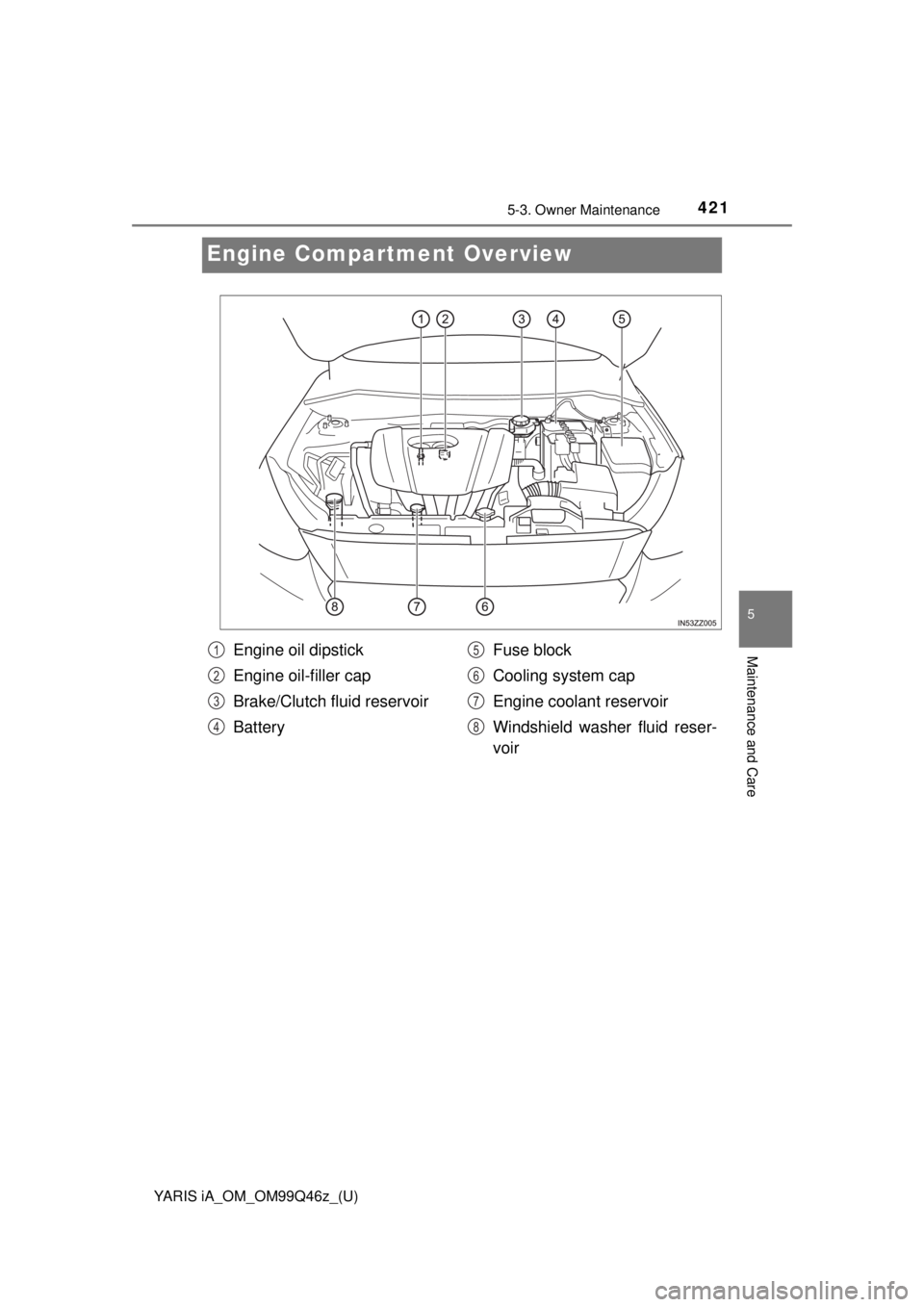
421
YARIS iA_OM_OM99Q46z_(U)
5-3. Owner Maintenance
5
Maintenance and Care
Engine Compartment Overview
Engine oil dipstick
Engine oil-filler cap
Brake/Clutch fluid reservoir
BatteryFuse block
Cooling system cap
Engine coolant reservoir
Windshield washer fluid reser-
voir1
2
3
4
5
6
7
8
Page 422 of 576
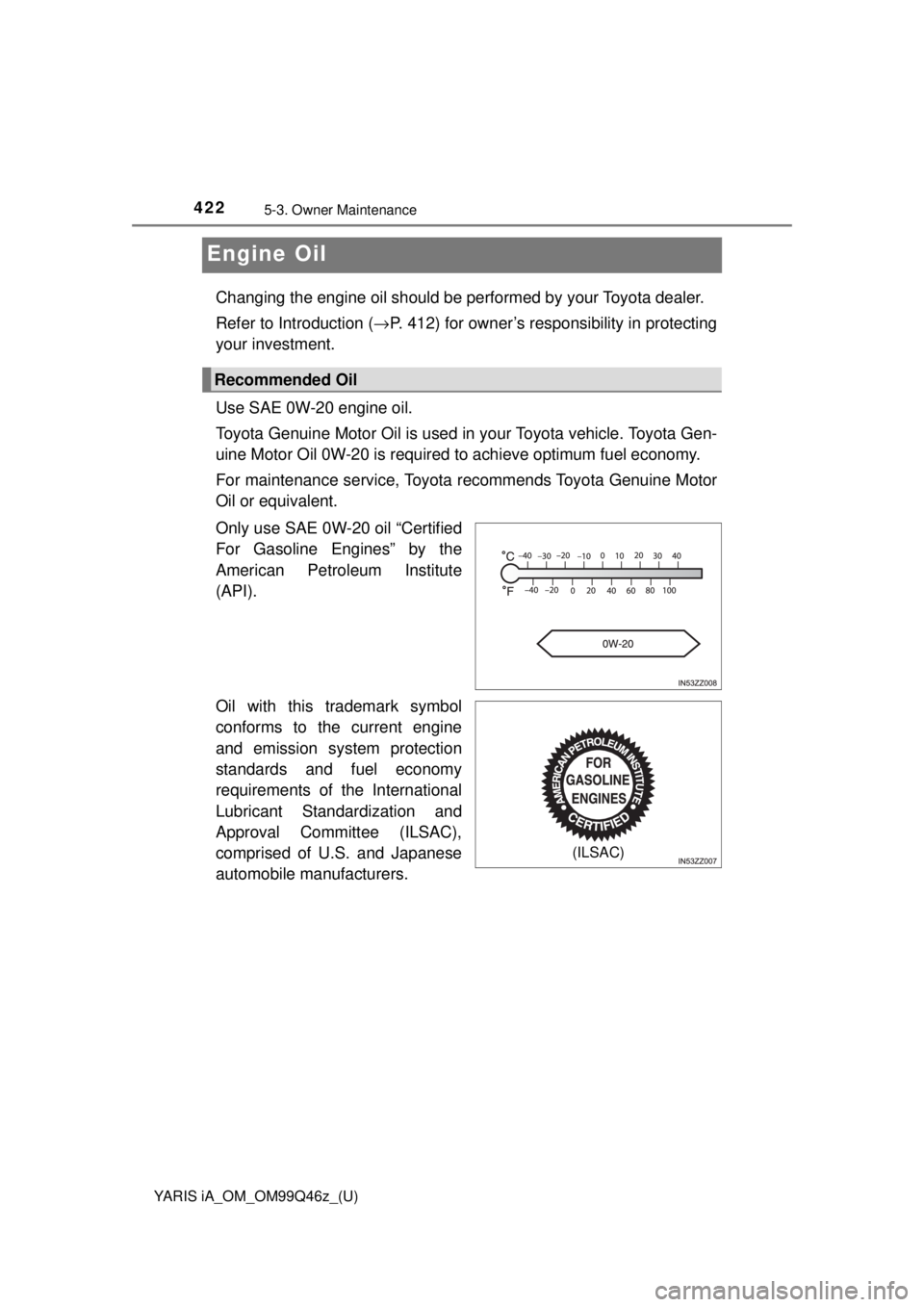
422
YARIS iA_OM_OM99Q46z_(U)
5-3. Owner Maintenance
Engine Oil
Changing the engine oil should be performed by your Toyota dealer.
Refer to Introduction (→P. 412) for owner’s responsibility in protecting
your investment.
Use SAE 0W-20 engine oil.
Toyota Genuine Motor Oil is used in your Toyota vehicle. Toyota Gen-
uine Motor Oil 0W-20 is required to achieve optimum fuel economy.
For maintenance service, Toyota recommends Toyota Genuine Motor
Oil or equivalent.
Only use SAE 0W-20 oil “Certified
For Gasoline Engines” by the
American Petroleum Institute
(API).
Oil with this trademark symbol
conforms to the current engine
and emission system protection
standards and fuel economy
requirements of the International
Lubricant Standardization and
Approval Committee (ILSAC),
comprised of U.S. and Japanese
automobile manufacturers.
Recommended Oil
(ILSAC)
Page 423 of 576
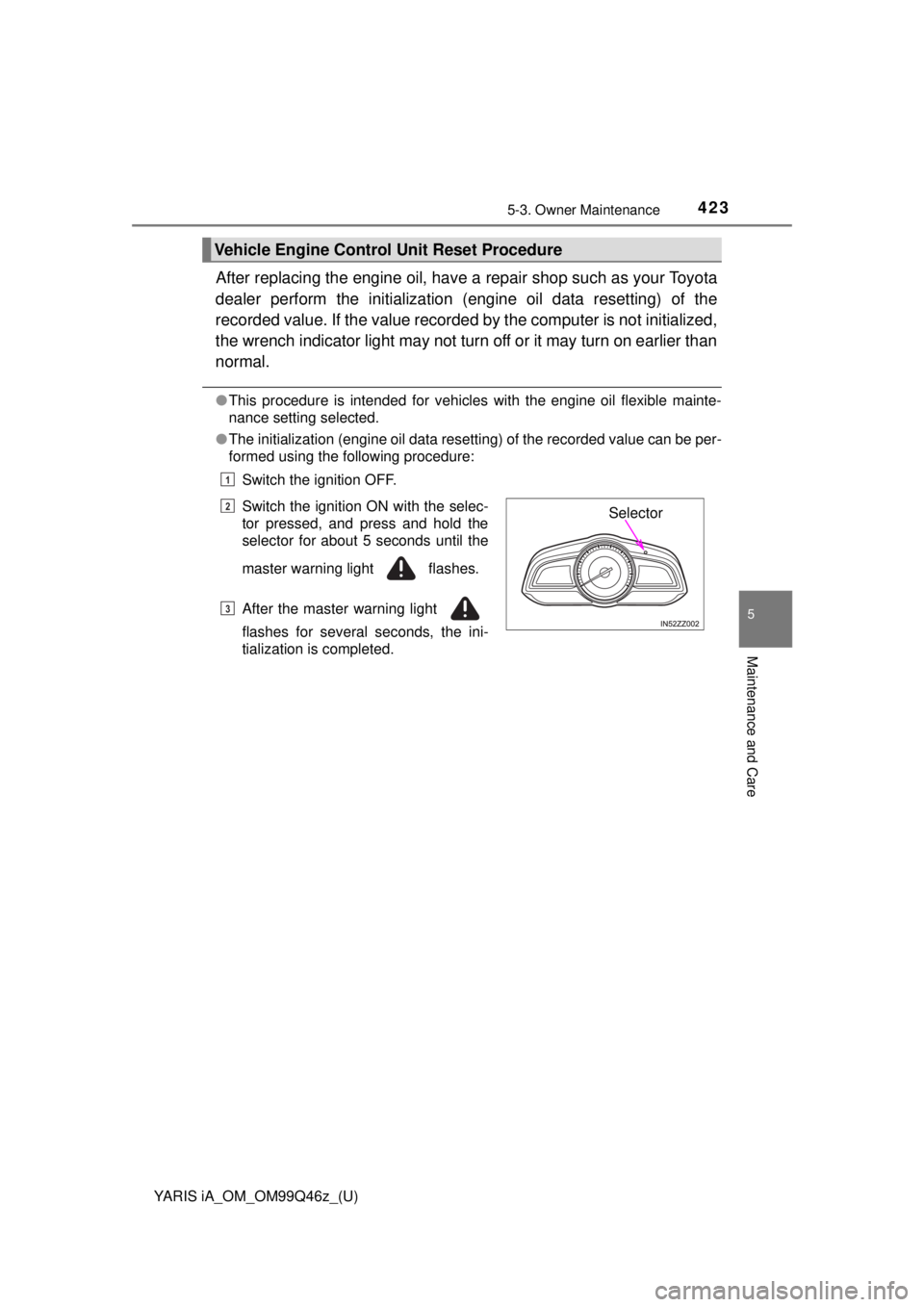
YARIS iA_OM_OM99Q46z_(U)
4235-3. Owner Maintenance
5
Maintenance and Care
After replacing the engine oil, have a repair shop such as your Toyota
dealer perform the initialization (engine oil data resetting) of the
recorded value. If the value recorded by the computer is not initialized,
the wrench indicator light may not turn off or it may turn on earlier than
normal.
● This procedure is intended for vehicles with the engine oil flexible mainte-
nance setting selected.
● The initialization (engine oil data resetting) of the recorded value can be per-
formed using the following procedure:
Switch the ignition OFF.
Vehicle Engine Control Unit Reset Procedure
Switch the ignition ON with the selec-
tor pressed, and press and hold the
selector for about 5 seconds until the
master warning light flashes.
After the master warning light
flashes for several seconds, the ini-
tialization is completed.
1
2
3
Selector
Page 424 of 576
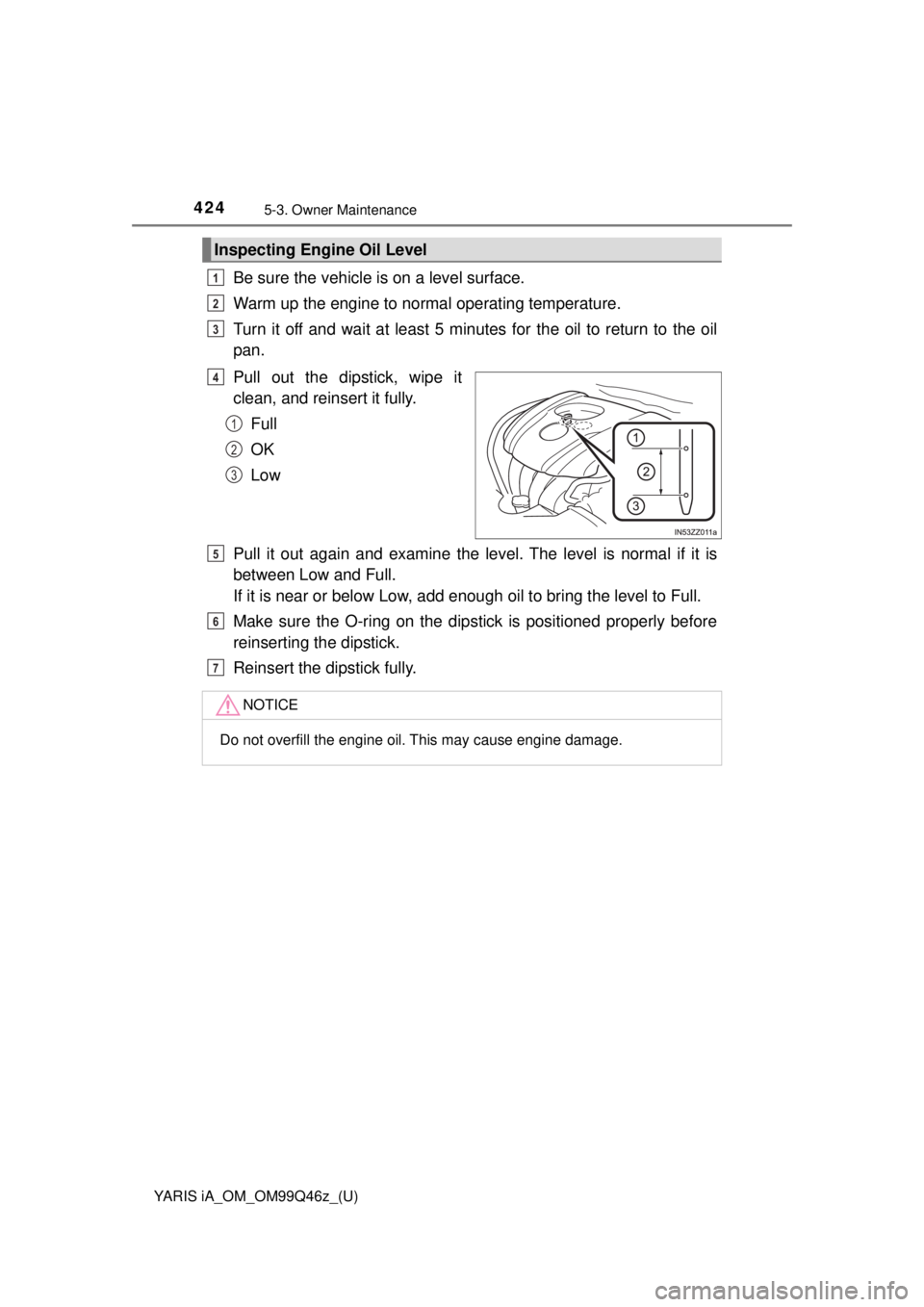
4245-3. Owner Maintenance
YARIS iA_OM_OM99Q46z_(U)
Be sure the vehicle is on a level surface.
Warm up the engine to normal operating temperature.
Turn it off and wait at least 5 minutes for the oil to return to the oil
pan.
Pull out the dipstick, wipe it
clean, and reinsert it fully.Full
OK
Low
Pull it out again and examine the leve l. The level is normal if it is
between Low and Full.
If it is near or below Low, add enough oil to bring the level to Full.
Make sure the O-ring on the dipstick is positioned properly before
reinserting the dipstick.
Reinsert the dipstick fully.
Inspecting Engine Oil Level
1
2
3
4
1
2
3
NOTICE
Do not overfill the engine oil. This may cause engine damage.
5
6
7
Page 425 of 576
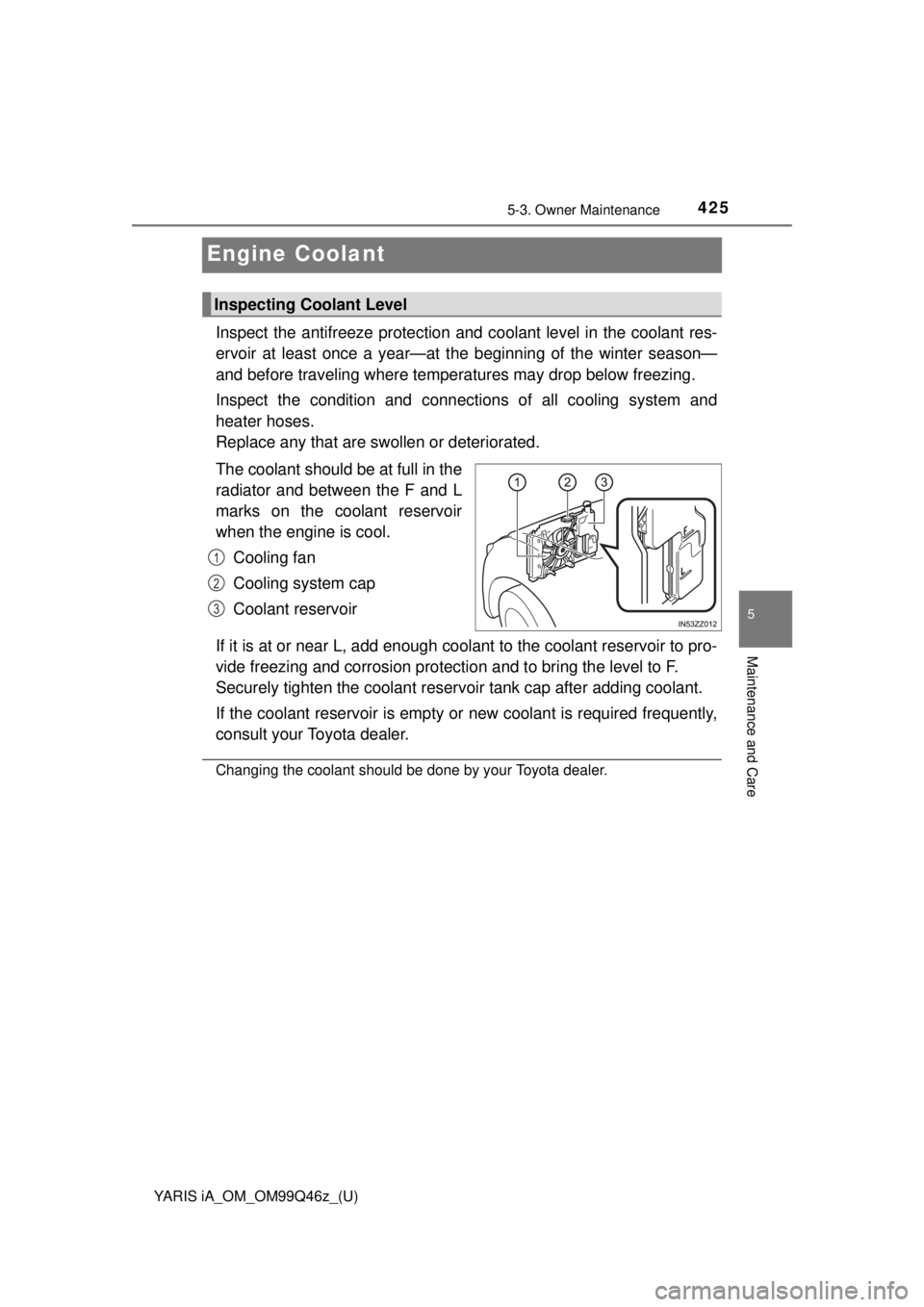
425
YARIS iA_OM_OM99Q46z_(U)
5-3. Owner Maintenance
5
Maintenance and Care
Engine Coolant
Inspect the antifreeze protection and coolant level in the coolant res-
ervoir at least once a year—at t he beginning of the winter season—
and before traveling where temperatures may drop below freezing.
Inspect the condition and connecti ons of all cooling system and
heater hoses.
Replace any that are swollen or deteriorated.
The coolant should be at full in the
radiator and between the F and L
marks on the coolant reservoir
when the engine is cool.
Cooling fan
Cooling system cap
Coolant reservoir
If it is at or near L, add enough coolant to the coolant reservoir to pro-
vide freezing and corrosion protecti on and to bring the level to F.
Securely tighten the coolant reserv oir tank cap after adding coolant.
If the coolant reservoir is empty or new coolant is required frequently,
consult your Toyota dealer.
Changing the coolant should be done by your Toyota dealer.
Inspecting Coolant Level
1
2
3
Page 426 of 576

4265-3. Owner Maintenance
YARIS iA_OM_OM99Q46z_(U)
WARNING
■Do not use a match or live flame in the engine compartment. DO NOT
ADD COOLANT WHEN THE ENGINE IS HOT
A hot engine is dangerous. If the engine has been running, parts of the
engine compartment can become very hot. You could be burned. Carefully
inspect the engine coolant in the coolant reservoir, but do not open it.
■ Pull over to a safe location, then switch the ignition to off and
make sure the fan is not running befo re attempting to work near the
cooling fan
Working near the cooling fan when it is running is dangerous. The fan could
continue running indefinitely even if the engine has stopped and the engine
compartment temperature is high. You could be hit by the fan and seriously
injured.
■ Do not remove either cooling system cap when the engine and
radiator are hot
When the engine and radiator are hot, scalding coolant and steam may
shoot out under pressure and cause serious injury.
Page 427 of 576
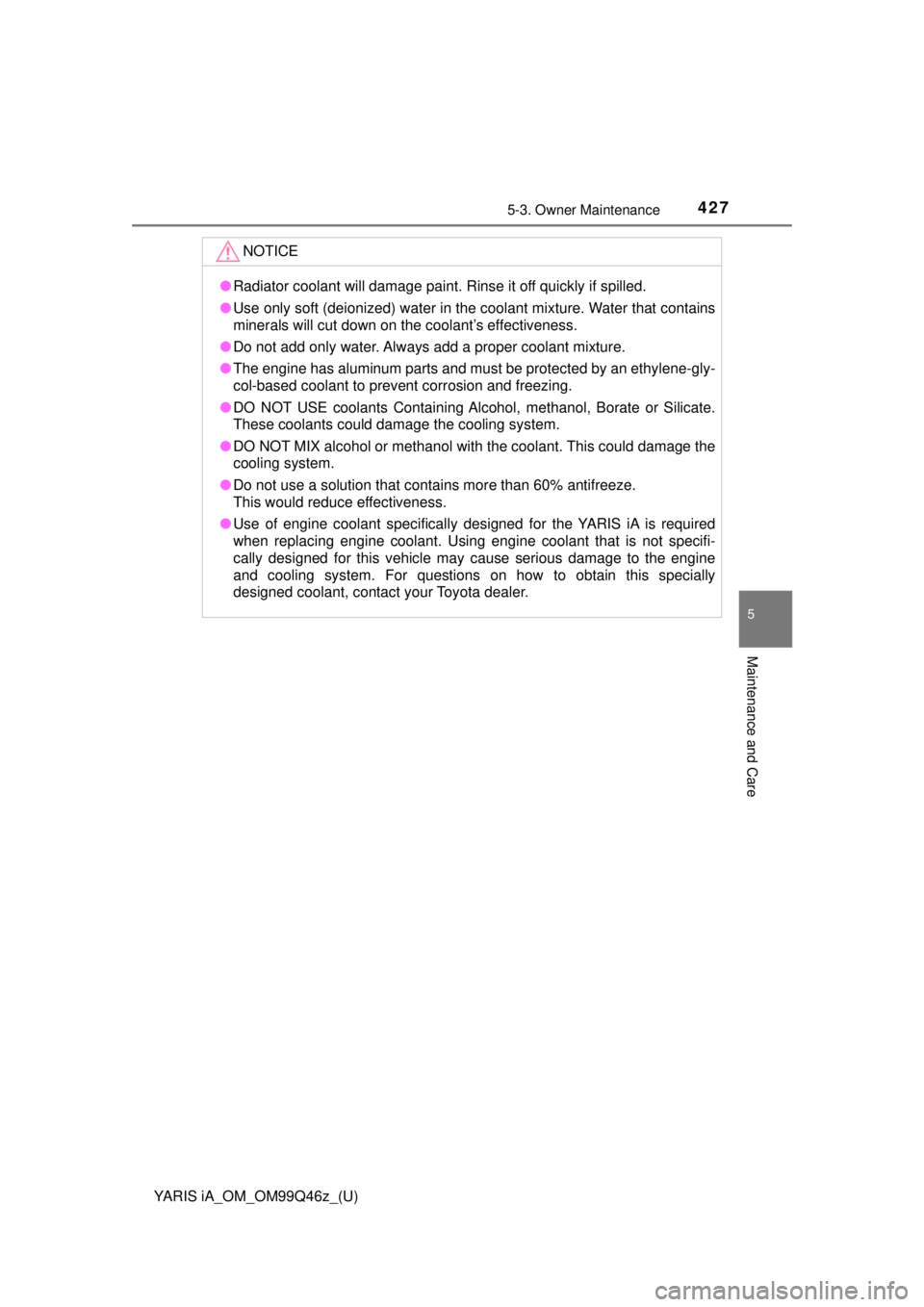
YARIS iA_OM_OM99Q46z_(U)
4275-3. Owner Maintenance
5
Maintenance and Care
NOTICE
●Radiator coolant will damage paint. Rinse it off quickly if spilled.
● Use only soft (deionized) water in the coolant mixture. Water that contains
minerals will cut down on the coolant’s effectiveness.
● Do not add only water. Always add a proper coolant mixture.
● The engine has aluminum parts and must be protected by an ethylene-gly-
col-based coolant to prevent corrosion and freezing.
● DO NOT USE coolants Containing Alcohol, methanol, Borate or Silicate.
These coolants could damage the cooling system.
● DO NOT MIX alcohol or methanol with the coolant. This could damage the
cooling system.
● Do not use a solution that contains more than 60% antifreeze.
This would reduce effectiveness.
● Use of engine coolant specifically designed for the YARIS iA is required
when replacing engine coolant. Using engine coolant that is not specifi-
cally designed for this vehicle may cause serious damage to the engine
and cooling system. For questions on how to obtain this specially
designed coolant, contact your Toyota dealer.
Page 428 of 576
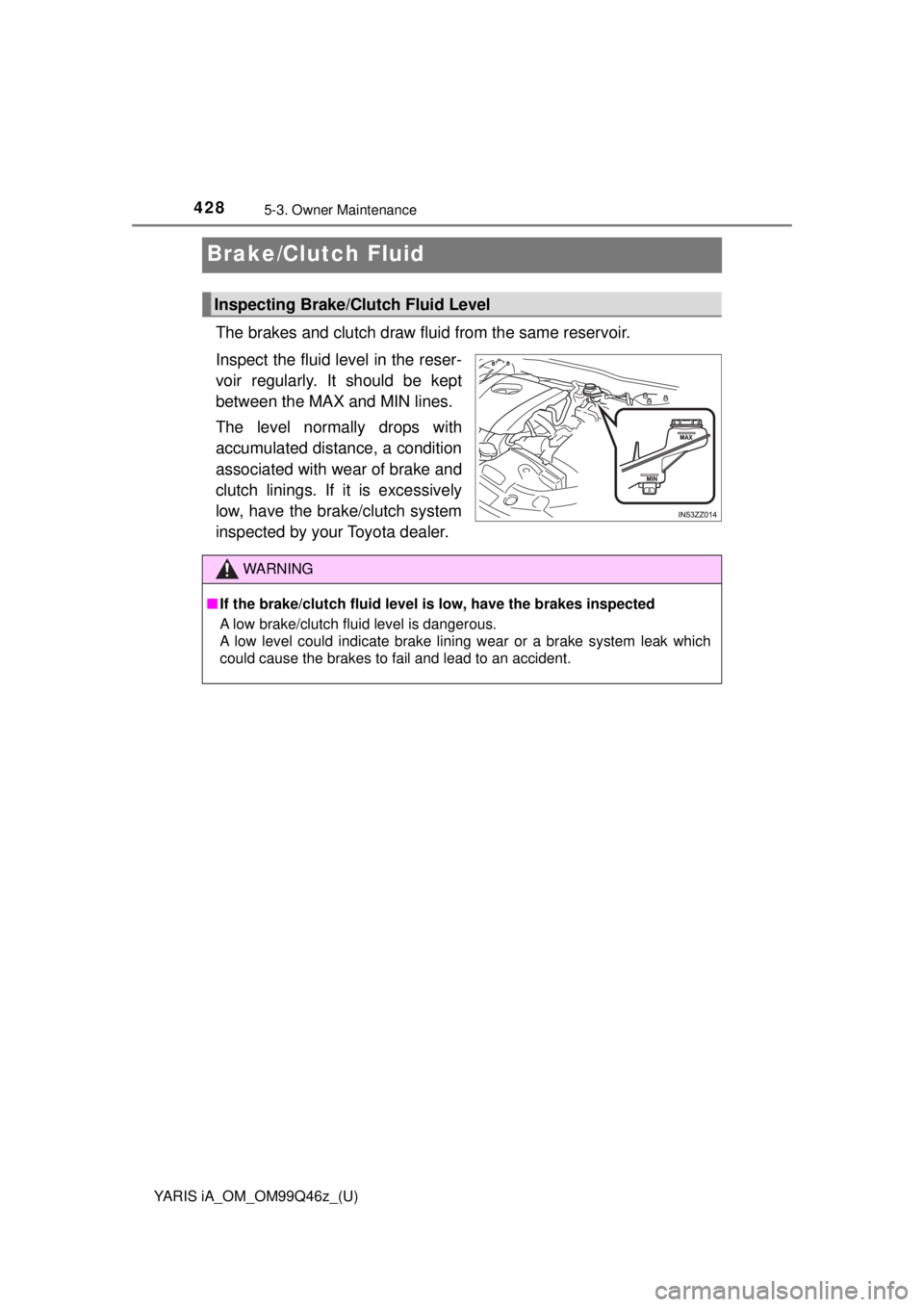
428
YARIS iA_OM_OM99Q46z_(U)
5-3. Owner Maintenance
Brake/Clutch Fluid
The brakes and clutch draw fluid from the same reservoir.
Inspect the fluid level in the reser-
voir regularly. It should be kept
between the MAX and MIN lines.
The level normally drops with
accumulated distance, a condition
associated with wear of brake and
clutch linings. If it is excessively
low, have the brak e/clutch system
inspected by your Toyota dealer.
Inspecting Brake/Clutch Fluid Level
WARNING
■ If the brake/clutch fluid level is low, have the brakes inspected
A low brake/clutch fluid level is dangerous.
A low level could indicate brake lining wear or a brake system leak which
could cause the brakes to fail and lead to an accident.
Page 429 of 576
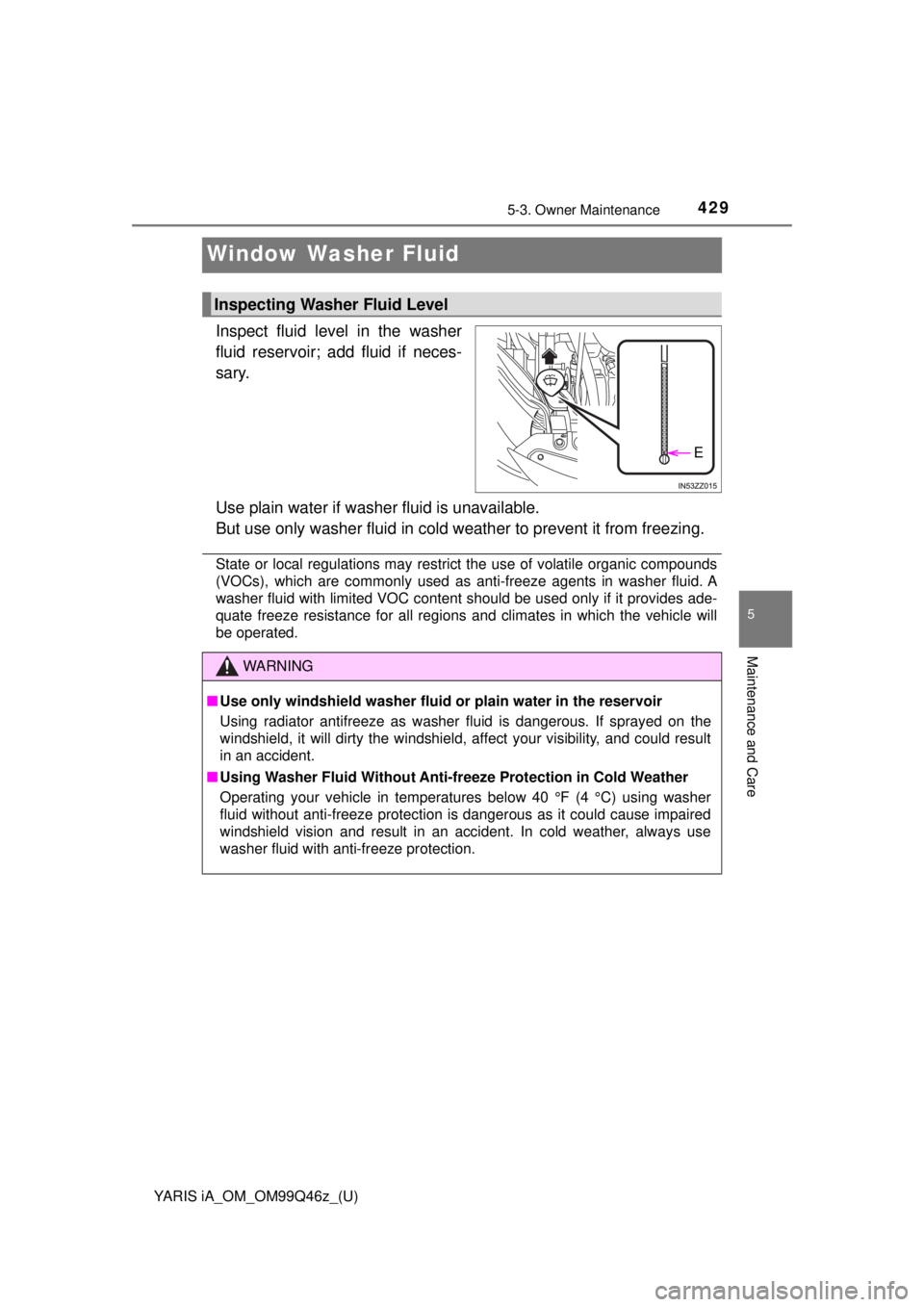
429
YARIS iA_OM_OM99Q46z_(U)
5-3. Owner Maintenance
5
Maintenance and Care
Window Washer Fluid
Inspect fluid level in the washer
fluid reservoir; add fluid if neces-
sary.
Use plain water if washer fluid is unavailable.
But use only washer fluid in cold weather to prevent it from freezing.
State or local regulations may restrict the use of volatile organic compounds
(VOCs), which are commonly used as anti-freeze agents in washer fluid. A
washer fluid with limited VOC content should be used only if it provides ade-
quate freeze resistance for all regions and climates in which the vehicle will
be operated.
Inspecting Washer Fluid Level
E
WARNING
■Use only windshield washer fluid or plain water in the reservoir
Using radiator antifreeze as washer fluid is dangerous. If sprayed on the
windshield, it will dirty the windshield, affect your visibility, and could result
in an accident.
■ Using Washer Fluid Without Anti-f reeze Protection in Cold Weather
Operating your vehicle in temperatures below 40 °F (4 °C) using wa\
sher
fluid without anti-freeze protection is dangerous as it could cause impaired
windshield vision and result in an accident. In cold weather, always use
washer fluid with ant i-freeze protection.
Page 430 of 576
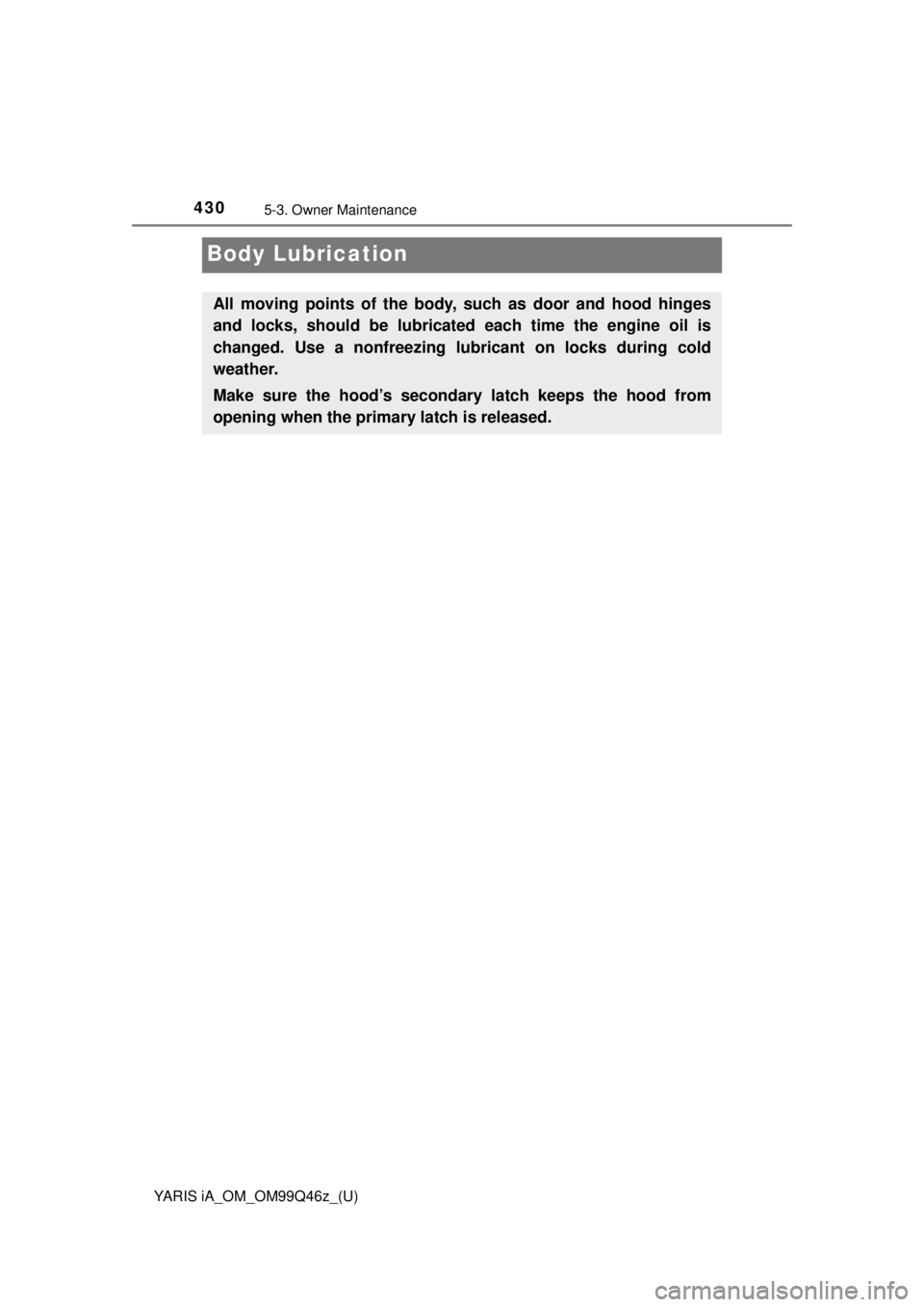
430
YARIS iA_OM_OM99Q46z_(U)
5-3. Owner Maintenance
Body Lubrication
All moving points of the body, such as door and hood hinges
and locks, should be lubricated each time the engine oil is
changed. Use a nonfreezing l ubricant on locks during cold
weather.
Make sure the hood’s secondary latch keeps the hood from
opening when the primary latch is released.